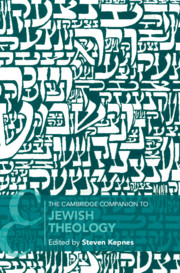Book contents
- The Cambridge Companion to JEWISH THEOLOGY
- cambridge companions to religion
- the cambridge companion to JEWISH THEOLOGY
- Copyright page
- Contents
- Notes on Contributors
- Acknowledgements
- 1 Introduction
- 2 What is Jewish Theology?
- Part I Biblical-Rabbinic
- Part II Medieval
- Part III Modern
- Part IV Contemporary Issues
- Part V Analytic Philosophy and Theology
- 16 Can There Be a Positive Theology?
- 17 Theological Realism and its Alternatives in Contemporary Jewish Theology
- 18 A Defense of Verbal Revelation
- 19 A Constructive Jewish Theology of God and Perfect Goodness
- Index
- Other Titles in the Series (continued from page ii)
- References
19 - A Constructive Jewish Theology of God and Perfect Goodness
from Part V - Analytic Philosophy and Theology
Published online by Cambridge University Press: 03 December 2020
- The Cambridge Companion to JEWISH THEOLOGY
- cambridge companions to religion
- the cambridge companion to JEWISH THEOLOGY
- Copyright page
- Contents
- Notes on Contributors
- Acknowledgements
- 1 Introduction
- 2 What is Jewish Theology?
- Part I Biblical-Rabbinic
- Part II Medieval
- Part III Modern
- Part IV Contemporary Issues
- Part V Analytic Philosophy and Theology
- 16 Can There Be a Positive Theology?
- 17 Theological Realism and its Alternatives in Contemporary Jewish Theology
- 18 A Defense of Verbal Revelation
- 19 A Constructive Jewish Theology of God and Perfect Goodness
- Index
- Other Titles in the Series (continued from page ii)
- References
Summary
I argue that a traditional Jewish conception of God should be that of a perfectly good being. This follows from the demand for our maximal love of God. A perfectly good being must have a perfectly good character and need have power and knowledge only to the degree needed to express its perfectly good character. It need not be omnipotent or omniscient. It would be eternal and creator and sustainer of the world. It is an open question whether God must be a metaphysically necessary being.
Keywords
- Type
- Chapter
- Information
- The Cambridge Companion to Jewish Theology , pp. 453 - 466Publisher: Cambridge University PressPrint publication year: 2020



